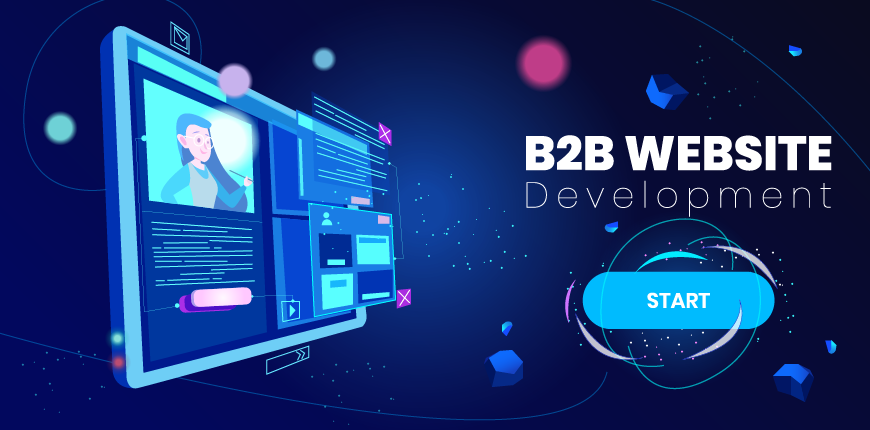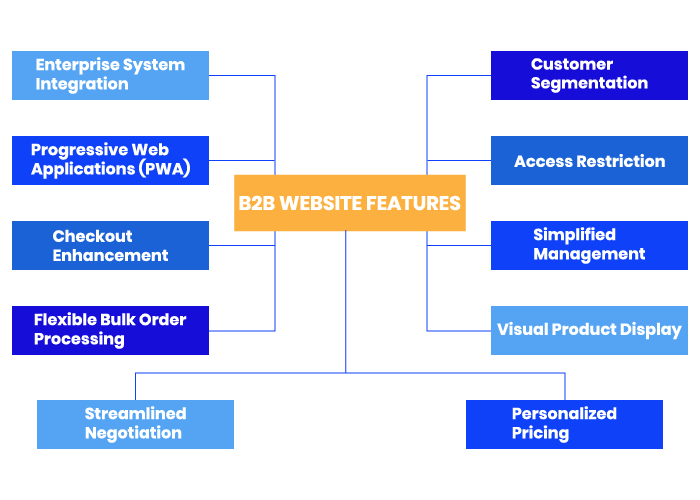With a team of competent B2B experts, BSS Commerce provides B2B website development on multiple platforms including Magento, Shopify, and BigCommerce to help you win more customers and yield sales. Let’s check our post to grab crucial B2B website features for your eCommerce store.
Advantages Of B2B ECommerce Selling
Table of Contents
For 2 years debating with the Covid-19 pandemic, merchants have realized the importance of online shopping and enter the eCommerce world at full tilt.
According to Forrester, B2B eCommerce is predicted to reach $1.8 trillion and account for 17% of all B2B sales in the U.S. by 2023, which is twice as big as B2C. Plus, more sales keep shifting from in-person to online.

You may be wondering what are the advantages of B2B eCommerce selling. There are many aspects you can benefit from this potential market such as:
- Larger order volumes and higher conversion rates;
- Huge demand for shopping online;
- Reducing B2B workload with B2C-like buying experiences;
- Shortened corporate buying journeys which may take months at offline businesses;
- Raising brand awareness and approaching more customer pools;
- Enhanced self-service account management.
Types Of B2B ECommerce Business
Let’s define which niche you should “attack” clearly to not lose track of your business goals. You can glance through the following types of corporate buyers and common business-to-business models to catch the idea of key B2B subjects.
Common B2B Buyers
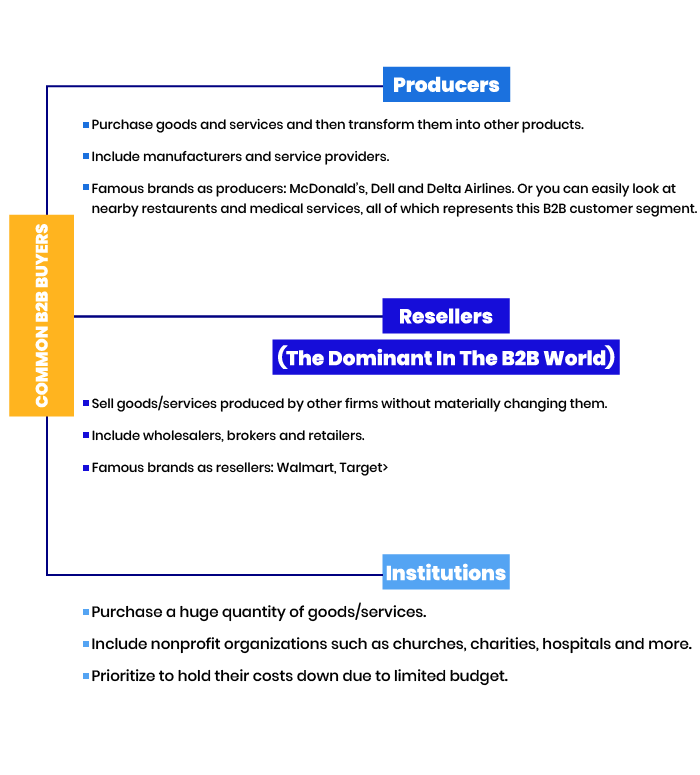
Types Of B2B ECommerce Business Model
- There are many buyers and few sellers.
- The marketplace is provided by the sellers.
- It needs a group of loyal customers to thrive.
- There are few buyers and many suppliers.
- The marketplace is provided by the buyers. Then they will attract suppliers/ sellers to display their products.
- There are many buyers and many suppliers.
- An intermediary company builds a site/ market where B2B buyers and sellers meet and do transactions with each other.
Steps To Prepare For A B2B ECommerce Launch
Step 1: Do market research thoroughly.
Step 2: Define your niche, product line, distribution channels, long-term goals.
Step 3: Know your audience by making your message clear and on-point.
Step 4: Clarify your unique selling points for a more powerful voice.
Step 5: Gather requirements and build use cases.
Step 6: Estimate building costs and establish the right budget.
Step 7: Choose the best-fit platform.
Step 8: Form a development team and align them with business goals.
Step 9: Pick a server hosting (for self-hosted solutions) and suitable themes.
Step 10: Prepare your business data and content.
Step 11: Decide essential B2B website features depending on your requirements.
Step 12: Conduct needed enterprise system integration.
Step 13: Customize your B2B eCommerce platform and launch.
CHECK B2B eCommerce website development guide to grab main points in the site building process!
B2B Website Features Checklist To Embrace Digital B2B Buying Journeys
- Enrich customer network through the informative and professional registration stage;
- Allocate each register to a specific group such as general, B2C, B2B and more, based on their address, gender, interests, order volume, etc;
- Support intuitive sales & marketing strategies.
- Require customers’ login to access private content/ catalogs/ pages tailored to specific customer groups;
- Validate buyer identity;
- Gain more customer information.
- Deliver self-service tools to corporate customers to manage company accounts, purchases, quotes, and more;
- Attach multi-users with different roles and permissions to a shared account;
- Assign dedicated sales reps to certain company accounts for better customer relationship management;
- Take full control of multi-source inventory to refill in time and avoid stockouts.
- Enable customers to create requisition lists of frequently purchased items to speed up restocking.
- Arrange products attractively with a simple drag-and-drop interface;
- Include additional files to give more product details that can’t be shown fully on the product page.
- Create custom prices and apply them to different customer groups;
- Deliver personalized experiences and grow customer loyalty.
- Hide prices of some products to serve the dealing process;
- Smooth request-for-quote flow to increase the efficiency of online negotiation.
Flexible Bulk Order Processing
- Set up minimum order amount to improve your bottom line;
- Facilitate B2B buyers to quickly place bulk orders under a single place without visiting each product page one by one;
- Fast reorder from order history in the customer dashboard.
- Offer promotions and bulk discounts to raise checkout success rate;
- Allow customers to save their shopping carts to complete their purchases later
- Integrate with multiple payment gateways, including PayPal, Braintree, Authorize.net, CyberSource and WorldPay;
- Utilize saved payment and shipping information to speed checkout and boost the conversion rate;
- Restrict some shipping & payment methods for specific customers/ groups based on their locations, order volumes, purchase frequency, and more.
- Grant B2B buyers with coupons, points or credits to use in the next purchase;
- Bring exclusive shopping experiences with private or flash sale sites.
Progressive Web Applications (PWA)
- Ensure app-like experiences that are fast, integrated, reliable and engaging to increase mobile traffic;
- Improve loading and implementation speed;
- Deliver seamless offline surfing;
- Enhance developer productivity with real-time, guided development.
- eCommerce ERP integration;
- CRM ERP integration;
- Project Management integration;
- Business Intelligence integration;
- EAM ERP integration;
- PIM integration.
>> Read more:
B2B eCommerce Platform Consideration
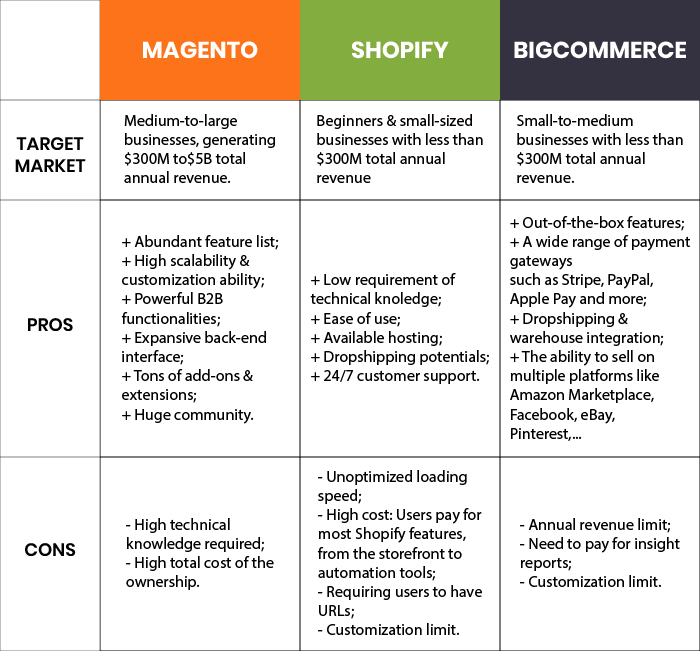
Want more details on these three common platforms? VISIT Magento vs Shopify vs BigCommerce comparison chart IMMEDIATELY!
Total Cost Of Ownership For B2B Website Building
Although the final B2B development costs vary according to each business, any site building would include some basic spending categories as follows:
- License fee (depending on specific platforms);
- Hiring a developer/ agency (optional);
- Domain name;
- Server hosting & theme;
- UX & UI design;
- B2B extensions/ applications (normally, B2B functionalities included in a platform fail to address all corporation needs);
- Integrations.
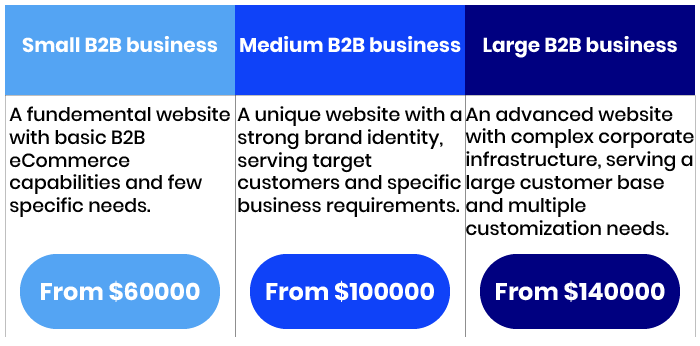
Consult BSS B2B Experts To Launch A B2B Website
For over a decade, BSS Commerce has been lying among top eCommerce solution providers all over the world.
As a pioneer in B2B online world, we offer a competent team, including senior project leaders, certified developers, testers, to deliver above-par B2B website development services and out-of-the-box solutions.
B2B Website Development
- Free consultation to detect your business requirements;
- Multi-platform: We can build a B2B site on any platform you choose, such as Shopify, BigCommerce, and Magento.
- Multi-industry serving: Simply pick the industry your business is operating in, and we’ll cover the rest;
- Hosting setup;
- Platform & theme installation;
- B2B functionality enrichment;
- Data migration;
- ERP integration.
We do provide a free consultation to explore deeper into your business requirements. Based on that, our B2B experts can give advice on the best-fit platform and break down your requirements into detailed steps. Let’s work with us on your B2B website development project right now!
